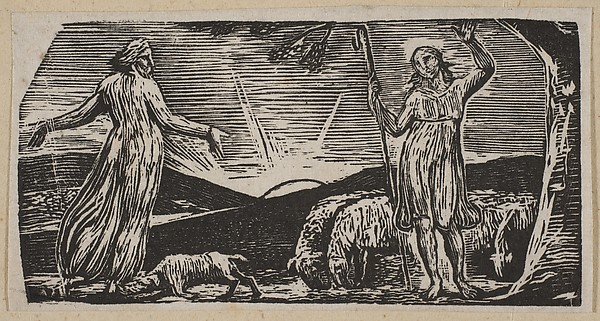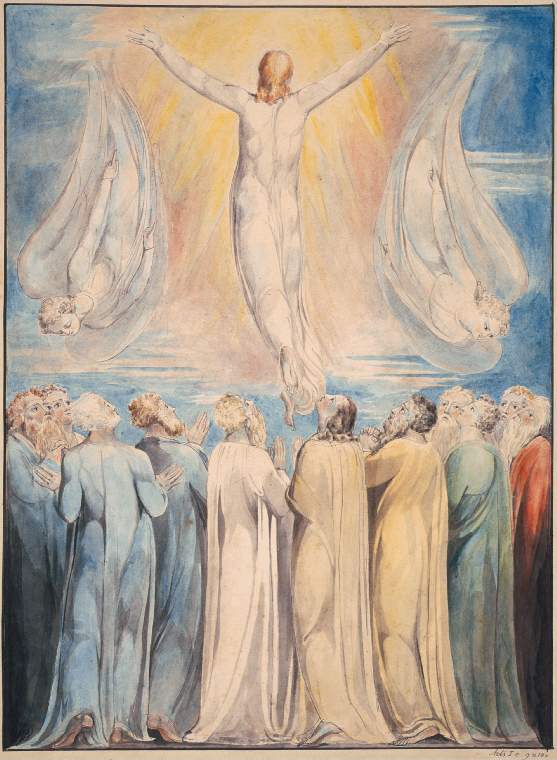 |
National Gallery of Art
Rosenwald Collection
The Pastorals of Virgil, 1821
Proof sheet printed by Blake |
Samuel Palmer was only 19 years old when he was introduced to William
Blake in 1824 by John Linnell. He remained under the influence of Blake 31 years later
when he wrote this letter to Alexander Gilchrist for inclusion in his
biography
The Life of William Blake. Palmer along with the other
'Ancients' admired Blake's woodcuts for Thornton's publication of
The Pastorals of Virgil.
From Samuel Palmer to Alexander Gilchrist:
"Kensington, Aug. 23d,
1855.
My Dear Sir,
I regret that the
lapse of time has made it difficult to recall many interesting
particulars respecting Mr. Blake, of whom I can give you no
connected account; nothing more, in fact, than the fragments of
memory; but the general impression of what is great remains with
us, although its details may be confused; and Blake, once known,
could never be forgotten.
His knowledge was
various and extensive, and his conversation so nervous and
brilliant, that, if recorded at the time, it would now have thrown
much light upon his character, and in no way lessened him in the
estimation of those who know him only by his works.
In him you saw at once
the Maker, the Inventor; one of the
few in any age: a fitting companion for
Dante. He was energy itself, and shed around him a kindling
influence; an atmosphere of life, full of the ideal. To walk
with him in the country was to perceive the soul of beauty
through the forms of matter; and the high gloomy buildings
between which, from his study window, a glimpse was caught of
the Thames and the Surrey shore, assumed a kind grandeur from
the man dwelling near them. Those may laugh at this who never
knew such an one as Blake; but of him it is the simple truth.
He was a man without
a mask; his aim single, his path straightforwards, and his wants
few; so he was free, noble, and happy.
His voice and manner
were quiet, yet all awake with intellect. Above the tricks of
littleness, or the least taint of affectation, with a natural
dignity which few would have dared to affront, he was gentle and
affectionate, loving to be with little children, and to talk
about them. "That is heaven," he said to a friend, leading him
to the window, and pointing to a group of them at play.
Declining, like Socrates, whom in many
respects he resembled, the common objects of ambition, and
pitying the scuffle to obtain them, he thought that no one could
be truly great who had not humbled himself " even as a little
child." This was a subject he loved to dwell upon, and to
illustrate.
His eye was the
finest I ever saw: brilliant, but not roving, clear and intent,
yet susceptible; it flashed with genius, or melted in
tenderness. It could also be terrible. Cunning and falsehood
quailed under it, but it was never busy with them. It pierced
them, and turned away. Nor was the mouth less expressive; the
lips flexible and quivering with feeling. I can yet recal it
when, on one occasion, dwelling upon the exquisite beauty of the
parable of the Prodigal, he began to repeat a part of it; but at
the words, "When he was yet a great way off, his father saw
him," could go no further; his voice faltered, and he was in
tears.
I can never forget
the evening when Mr. Linnell took me to Blake's house, nor the
quiet hours passed with him in the examination of antique gems,
choice pictures, and Italian prints of the sixteenth century.
Those who may have read some strange passages in his Catalogue, written in
irritation, and probably in haste, will be surprised to hear,
that in conversation he was anything but sectarian or exclusive,
finding sources of delight throughout
the whole range of art; while, as a critic, he was judicious
and discriminating.
No man more
admired Albert Diirer; yet, after looking over a number of his
designs, he would become a little angry with some of the
draperies, as not governed by the forms of the limbs, nor
assisting to express their action; contrasting them in this
respect with the draped antique, in which it was hard to tell
whether he was more delighted with the general design, or with
the exquisite finish and the depth of the chiselling; in works
of the highest class, no mere adjuncts, but the last
development of the design itself.
He united freedom
of judgment with reverence for all that is great. He did not
look out for the works of the purest ages, but for the purest
works of every age and country—Athens or Rhodes, Tuscany or
Britain; but no authority or popular consent could influence
him against his deliberate judgment. Thus he thought with
Fuseli and Flaxman that the Elgin Theseus, however full of
antique savour, could not, as ideal form, rank with the very
finest relics of antiquity. Nor, on the other hand, did the
universal neglect of Fuseli in any degree lessen his
admiration of his best works.
He fervently loved
the early Christian art, and dwelt with peculiar affection on
the memory of Fra Angelico, often speaking of him as an
inspired inventor and as a saint; but when he approached
Michael Angelo, the Last Supper of Da Vinci, the Torso
Belvidere, and some of the inventions preserved in the Antique
Gems, all his powers were concentrated in admiration.
When looking at the heads of the apostles
in the copy of the Last Supper at the Royal
Academy, he remarked of all but Judas,' Every one looks as if
he had conquered the natural man.' He was equally ready to
admire a contemporary and a rival. Fuseli's picture of Satan building the Bridge over Chaos he ranked with the
grandest efforts of imaginative art, and said that we were two
centuries behind the civilization which would enable us to
estimate his /Egisthus.
He was fond of the
works of St. Theresa, and often quoted them with other writers
on the interior life. Among his eccentricities will, no doubt,
be numbered his preference for ecclesiastical governments. He
used to ask how it was that we heard so much of priestcraft,
and so little of soldiercraft and lawyercraft.
The Bible, he said, was the book of liberty
and Christianity the sole regenerator of nations. In politics
a Platonist, he put no trust in demagogues. His ideal home was
with Fra Angelico: a little later he might have been a
reformer, but after the fashion of Savonarola.
He loved to speak
of the years spent by Michael Angelo, without earthly reward,
and solely for the love of God, in the building of St.
Peter's, and of the wondrous architects of our cathedrals. In
Westminster Abbey were his earliest and most sacred
recollections. I asked him how he would like to paint on
glass, for the great west window, his "Sons of God shouting
for Joy," from his designs in the Job. He said, after a
pause, "I could do it!" kindling at the thought.
Centuries could
not separate him in spirit from the artists who went about our
land, pitching their tents by the morass or the forest side,
to build those sanctuaries that now lie ruined amidst the
fertility which they called into being.
His mind was large
enough to contain, along with these things, stores of classic
imagery. He delighted in Ovid, and, as a labour of love, had
executed a finished picture from the Metamorphoses, after
Giulio Romano. This design hung in his room, and, close by his
engraving table, Albert Diirer's Melancholy the Mother of Invention, memorable as
probably having been seen by Milton, and used in his Penseroso. There are
living a few artists, then boys, who may remember the smile of
welcome with which he used to rise from that table to receive
them.
His poems were
variously estimated. They tested rather severely the
imaginative capacity of their readers. Flaxman said they were
as grand as his designs, and Wordsworth delighted in his Songs 0/ Innocence. To the
multitude they were unintelligible. In many parts full of
pastoral sweetness, and often flashing with noble thoughts or
terrible imagery, we must regret that he should sometimes have
suffered fancy to trespass within sacred precincts.
Thrown early among the authors who resorted
to Johnson, the book-seller, he rebuked the profanity of
Paine, and was no disciple of Priestley; but, too
undisciplined and cast upon times and circumstances which
yielded him neither guidance nor sympathy, he wanted that
balance of the faculties which might have assisted him in
matters extraneous to his profession. He saw everything
through art, and, in matters beyond its range, exalted it from
a witness into a judge.
He had great
powers of argument, and on general subjects was a very patient
and good-tempered disputant; but materialism was his
abhorrence: and if some unhappy man called in question the
world of spirits, he would answer him "according to his
folly," by putting forth his own views in their most
extravagant and startling aspect. This might amuse those who
were in the secret, but it left his opponent angry and
bewildered.
Such was Blake, as I remember him. He was
one of the few to be met with in our passage through life, who
are not, in some way or other, "double minded " and
inconsistent with themselves; one of the very few who cannot
be depressed by neglect, and to whose name rank and station
could add no lustre. Moving apart, in a sphere above the
attraction of worldly honours, he did not accept greatness,
but confer it. He ennobled poverty, and, by his conversation
and the influence of his genius, made two small rooms in
Fountain Court more attractive than the threshold of princes.
I remain, my dear
Sir,
Yours very
faithfully,
Samuel Palmer. To
Alexander Gilchrist, Esq."
.














